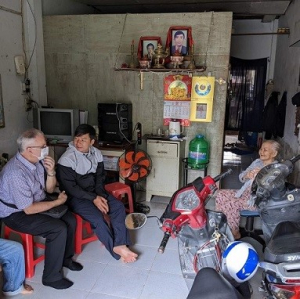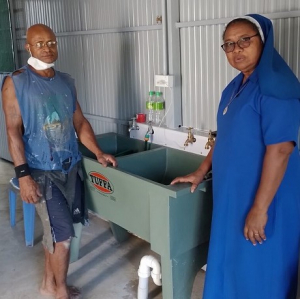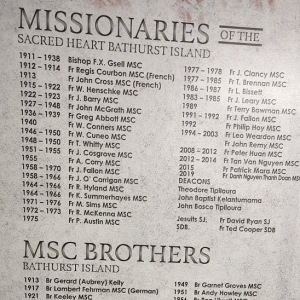Peter MALONE
Body in the LIbrary, The/ 2004
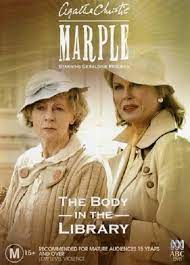
THE BODY IN THE LIBRARY
UK, 2004, 90 minutes, Colour.
Geraldine McEwen, Joanna Lumley, Simon Callow, Jack Davenport, Ian Richardson, James Fox, Tara Fitzgerald, Jamie Theakston, Florence hope, Ben Miller, Emma Cooke, Mary Stockley, Emma Williams, Adam Garcia, David Walliams.
Directed by Andy Wilson.
Geraldine McEwan is enjoying herself as Miss Marple in this particular story, capitalising on her friendship with Dolly Bantry (Joanna Lumley at her best), visiting, sleuthing, interfering, proposing theories, solving the case. (Spoiler alert.)
The screenplay remains quite faithful to Agatha Christie’s novel – except for the ending. In the novel, the murderer is Mark with Josie, with Adelaide inheriting the money for herself and her son. In this film version, the order is reversed, Mark finishes up as the decent man, though a gambler, looking after the son. Adelaide is revealed to be in a lesbian relationship with Josie – perhaps something with Agatha Christie herself would not quite have approved of.
There is a setting and the mansion, as always, but also at the beach hotel resort.
Simon Callow is the detective, rather pompous in his manner a dominating compared with some of the other police inspectors in the films. Is assisted by Jack Davenport who is the opposite of Callow’s pompousity. There are plenty of suspects including Jamie Theakston, Ben Miller, Adam Garcia, David Walliams. However, audiences need to pay attention to Mary Stockley as the cousin of the dead woman.
And, for older audiences, there is the pleasure of seeing Ian Richardson and James Fox in the cast as well as Tara Fitzgerald.
The central conceit of having the wrong body in the library is again one of Agatha Christie’s masterstrokes.
- Popularity of Agatha Christie novels? Film versions? Miss Marple? The actresses portraying her?
- The title, the focal point, the twist of the mystery, not the right body? The plan going wrong?
- Miss Marple and her friendship with a Dolly Bantry, staying with her, the holiday at the hotel, Dolly her continual advocate, helping with the sleuthing? Arthur Bantry, military background, the body in the library, the effect on him, moping? Suspicions?
- The Prologue, the dinner, the toast, Jefferson, the next generation, the war, marriage, the bomb in the explosion,
- The maid? Finding the body, Miss Marple and Dolly looking at it? The arrival of the police? Colonel Melchert, knowing Miss Marple? His pompous manner? Harper, the opposite, working with the Colonel? Their methods, examining scenes, the range of interviews? The conversations with Miss Marple, her theories? The eventual explanation and their reactions?
- Josie, her dancing, her ankle, cousin, identifying the body (and the later expose of her lie and the consequent scenario)? The helping with the investigation, dropping hints and names?
- The buildup of suspicious characters, Blake, films, his house, his manner, his wife and her tantrum, not revealing they were married? The later visit from Miss Marple, the irony of his finding the body, moving it, drunk, a shock for Arthur Bantry? Raymond Starr, Latin background, the dancing, with Josie, with Ruby? The middle-aged woman, the gigolo at the hotel? His alibis? Bartlett, his car missing, absent-minded, stammering, awkward, alibi? Trying to give information?
- Jefferson, losing his legs, staying at the hotel, his money, Mark and Adelaide, Adelaide and Peter, the prospects? His attraction towards Ruby, enjoying her company, the photo of Blake, the touches of jealousy? His finally agreeing to Miss Marple’s suggestion, pretending to sleep, catching Josie trying to kill him?
- Adelaide, widow, her son, the bond with Jefferson? Mark, son-in-law, gambler, losing his money? Miss Marple talking with each of them? Mark, genuine, self-knowledge, upset?
- Miss Marple, the issue of the girl guides, the dead girl in the burnt car, her friend, the talk of being approached by a film producer, going to the make up session, her being killed, the body in the car?
- Miss Marple realising the switching of the bodies? Working out with Blake how the body was in the library? Suspicions of Josie? And the realisation of the relationship with Adelaide? The two and their plan? The scene of them on the beach?
- The arrest, in prison?
- Miss Marple, Dolly and her admiration during the explanation? Onto the next case?
Mrs Harris Goes to Paris
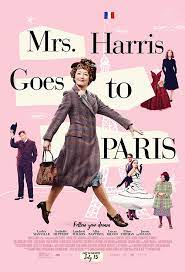
MRS HARRIS GOES TO PARIS
UK, 2022, 115 minutes, Colour.
Lesley Manville, Isabelle Huppert, Lambert Wilson, Alba Baptista, Lucas Bravo, Ellen Thomas, Rose Williams, Jason Isaacs, Anna Chancellor, Christian McKay, Freddie Fox, Philippe Bertin.
Directed by Anthony Fabian.
Blimey! And je ne sais quoi (many times over)! For those under 40, who intend to take their mother and/or their grandmother to see a film, this is an answer to prayer.
We are in London, amongst the working class, 1957. And we are introduced to Mrs Ada Harris. She is a diligent housecleaner, seeing her at work in various untidy places, and at the service of some rich families (who find reasons not to pay her on time). Her husband has disappeared during the war with no trace. She still grieves for him.
This film is based on a novel by Paul Gallico (prolific writer, sports commentator, film reviewer, many novels and short stories including The Snow Goose and, possibly best known for The Poseidon Adventure). He wrote four novels about Mrs ‘Arris (the present film being pronunciation incorrect but looking more grammatical so to speak). There was a previous version for television starring Angela Lansbury.
This time it is Leslie Manville, an experienced actress with a wide range, well remembered for several Mike Leigh films. She is a lively character and endears herself to most people – and to the audience.
The film is something of a fairytale, if only… Ada Harris sees a Dior dress, told that it costs £500. And this becomes her dream, saving up the pennies and pounds, discovering she is entitled to a war widow’s pension, following the pools each week and winning, gradually building up some money but, with her close friend and co-worker, Violet (Ellen Thomas) and a genial rogue bookmaker, Archie (Jason Isaacs) from Northern Ireland, she risks her money on the greyhounds, and loses. Nevertheless, the dream becomes more intense and, gradually, she finds she can get her passport and is on the plane to Paris, just to buy the dress and return after 24 hours.
And, so, from the streets and houses of London, we find ourselves with Mrs Harris in Paris, a dingy start because the plane is late, the streets are full of uncollected garbage, a genial homeless man guiding her towards the house of Dior. It is fashion show day and, in helping someone out, she finds herself in the building, the wealthy passing into the room where she was first in the queue! And she finds the villain of the film, Madame Colbert, the manager (Isabelle Huppert) who takes every opportunity to oust her. But, there is always a gallant Frenchman about, a Marquis, widower, charming (Lambert Wilson) who takes Mrs Harris and his wing. While the fashion show is designed for the clientele, it is also designed for the cinema audience.
(Recently there was the French film Haute Couture, contemporary, but also taking into the world of fashion and the Dior company.)
The important thing for the company is that Mrs Harris actually has cash and that is in short supply at Dior. So, she is measured for her dress, absolutely entranced, making friends with the staff, some matchmaking with the financial manager who has invited her to stay in his sister’s room while she is in Paris, and to wear her clothes, the manager attracted to one of the models who would much prefer to be a student.
Sightseeing in Paris, the Marquis paying great attention to her, taking her to a show, a whole different world from what she was used to.
Mrs Harris would have made a great organiser if she had been in a union in the UK. There is a wonderful sequence where many of the women have been sacked by Madame Colbert, are on strike, rounded up by Mrs Harris, gathering all the rest of the staff, wanting to confront Mr Dior himself and for Andre to explain his plans for the extension of the company, to reach out to ordinary women. She is triumphant. She gets her dress and goes home.
Dream fulfilled – but not quite - she is generous, but suffers a setback with her dress, but, in the world of Dior, all is well and the fairytale comes to a happy end and we leave the cinema content.
- Memories of Britain in the 1950s? Ada Harris as an archetypal character? Class distinctions, cleaning lady, dreams, aspirations, Paris and Dior as a dream?
- The London settings, the period, streets, homes, clubs, the contrast with Paris, though the garbage and streets, the tour of Paris, the house of Dior, the interiors, the fashion show? The musical score?
- Lesley Manville’s portrait of Mrs Harris, age, her husband lost in the war, the news coming about his death, a war widow, photo, devotion to him? The return of the ring?
- Pondering on the bridge, her hopes? Her work, the untidy actress, Lady Dant and the Dior dress, Lady Dant not paying her? Fascinated by the dress? Her decision to buy a dress?
- The money situation, the officer arriving with the news of her husband’s death, her antipathy, his giving her the pension? Her work, savings? Friendship with Archie, going to the greyhound racing, risking the hundred pounds, the complete failure? Archie and his giving some money back? Gradually getting enough money?
- Violet, friend, bus trips, conversations, the conductor and his friendship? The work together? Ada confiding in Violet? At the races and the money loss?
- Alfie, Northern Ireland, the bookie, his charm, at the races, not wanting to take her bet, the aftermath? The end, and their dancing together?
- Preparation for Paris, the passport? On the plane, falling asleep? Late? Going to the depot, the friendly homeless men, the man guiding her to Dior? At the end, returning to him, and their helping and pointing out Natasha?
- At Dior, the day of the show, the guests arriving, Natasha dropping her purse, Mrs Harris pursuing her, getting into the building? The reactions of Madame,Colbert, haughty? The variety of reactions? The Marquis, gallant, accompanying her, the seat, the arrogant woman and her daughter, even hitting Mrs Harris? The fashion show, the number of gowns, for the audience as well as a film audience? Mrs Harris and her choice, the haughty woman taking it, Mrs Harris and her second choice?
- The financial situation, needed cash, the future and Dior credit? Andre, his management, inviting Mrs Harris to his apartment, to wear his sister’s clothes? And the friendship with Natasha, her existentialist book, Mrs Harris on crime stories? Her cleaning up the apartment with Natasha, the meal?
- The staff and Dior, friendly to Mrs Harris? Carre and the measurements, his manner? Madame Colbert and her interventions?
- The Marquis, walking the dog, going to the flower market, the roses, the invitation to her, the tea, his reminiscing about the domestic lady at school? Mrs Harris interpreting this is condescending and leaving?
- The night out on the town, the Marquis, the meal, the show? Her drinking, the next morning, late, Carre and his refusing to do the measurements? But impressed by her sewing? Her being ousted? The support of the staff, their showing her around the cutting rooms and the plant?
- Her matchmaking with Andre and Natasha? Andre and his shyness? His hopes for the company?
- Mrs Harris, returning, the women on strike, gathering together, marching through the establishment, gathering all the women, the confronting with Madame Colbert, determining to see Dior, Andre in his office, going into Dior’s office, letting Andre make his explanations about adaptations for Dior, reaching out to a range of women? Madame Colbert and her resigning?
- The touch of the fairytale? The visit to Madame Colbert, looking after her husband, the plea to her, her change of heart?
- The importance of Mrs Harris having the cash, and the delivery of the dress, her happy time in Paris?
- At home? the actress coming, desperate, Mrs Harris and the decision to blend her the dress, the next morning, the burnt dress? Her sadness? The media, the French media? The discussions with the violet? With Archie?
- The message from Paris, the dress, news of the accident in the French paper, the reputation of Dior? With Archie and Violet, going to the dance, wearing the dress, her entry, dancing with Archie?
Pocket Full of Rye, A/ 2009
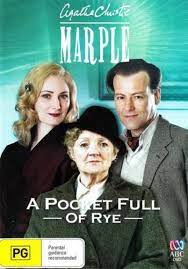
A POCKET FULL OF RYE
UK, 2009, 93 minutes, Colour.
Julia McKenzie, Matthew McFadyen, Rupert Graves, Rose Heiney, Kenneth Cranham, Lucy Cohu, Edward Tudor-Pole, Ralf Little, Helen Baxendale, Ken Campbell, Anna Madeley, Joseph Beattie, Wendy Richard, Ben Miles, Prunella Scales.
Directed by Charlie Palmer.
Agatha Christie’s Miss Marple has been very popular on screen, the last being Julia McKenzie.
In reading the Google synopsis of A Pocket Full of Rye, it coheres very well with the the plot outline of this film version, even to Miss Marple returning home, Gladys’s letter and the incriminating photo.
The period is the 1950s, some memories of World War II. However, it is the world of business in the 1950s, Kenneth Cranham as an autocrat and ruining his company, Ben Miles as his very business -like son and Rupert Graves as the rebellious son who has lived in Africa. There is also his dominated daughter.
As with these films, most of the action takes place in a country mansion – with some scenes in the local hotel.
This is the first of the Julia McKenzie portrayals of Miss Marple, not quite the certainty of Joan Hickson and not the twee ingratiating Geraldine McEwan.
Often Miss Marple dominates the investigating expect but in this case, the very serious Matthew McFadyen is always able to stand his ground.
There are quite a number of suspects and the final twist is an elaborate but very well done – and an unexpected, though not necessary, twist with the identifying of the daughter of the minor, Ruby McKenzie.. And there is a bonus with Prunella Scales having a cameo as the elderly mother.
As always, plenty of suspects, some good twists, and Miss Marple working with the police and outdoing them.
- The nursery rhyme, the references, the rye in the pocket, the maid in the garden, the blackbirds…?
- Popularity of Agatha Christie, the various versions of Miss Marple?
- The introduction to Gladys and Miss Marple, Gladys and her hopes, going into service, at the mansion, the death of Mr Fortescue? Her denials? Miss Marple visiting, Gladys’s room, her death, the posters and cuttings, the clues for the poisoning and introducing it? The cards from Bert? The final letter, and the photo, the final clue?
- The introduction to Rex Fortescue, eye for the women, his recent marriage to Adele, younger? Relationship with Patrick, the erratic behaviour, senility, business deals? Relationship with Lancelot, forged check, Lancelot in Africa, returning home? His strict demands on his daughter? The collapse at work, his death? Seen in flashbacks, erratic behaviour?
- The scenes of Lance, his wife, Paris, love for each other, coming to England, his arrival on the plane, met by the police, the train, charming in the house, reaction to the murders? The discussions with Patrick, wanting to participate in the company? Going to the office and making demands?
- Adele, young, the affair with the golf coach? The golf coach at the hotel, under suspicion, her death?
- Elaine, her father’s demands, the teacher, his Communist ideas, the breakup, his return, under suspicion?
- Mary Dove, the role in household, in command, management, present, under suspicion, the revelation about her blackmailing Jennifer?
- Jennifer, the nurse, nursing Patrick, the marriage, happy or not, at home, eating the chocolates? And the twist that she was the McKenzie daughter?
- Miss Marple, coming, listening in, investigating, Gladys’s room, the discussions with Inspector Neele? Explaining the case?
- Inspector Neele, his assistant, very serious, carrying out his work, the range of interviews, ever present, theories, the McKenzie issue and the daughter? Working with Miss Marple, listening to the explanations?
- The Blackbird mine, Tanganyika, the mistaken torn of West Africa instead of East Africa? The references to blackbirds, in the desk, in the pie, Jennifer and the blackbirds?
- Miss Marple, the visit to the mother, in the home, implacable, her son’s death, her daughter disappearing?
- Miss Marple working out what happened, who was responsible, the speculations, leaving it with the Inspector? Returning home, Gladys’s letter, the explanation, and the photo with Lance?
Wish Man
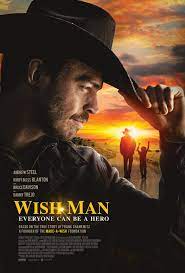
WISH MAN
US, 2019, 107 minutes, Colour.
Andrew Steele, Kirby Bliss Blanton, Tom Sizemore, Frank Whaley, Julian Curtis, Robert Pine, Fay Masterson, Steven Michael Quesada, Bruce Davison, Jason Gerhardt, Dale Dickie, Christian Ganiere, Chris Day, Larry Wilcox, Danny Trejo.
Directed by Theo Davies.
This film has been released sometimes in connection with faith films. While, there is a sense of the presence of God, it is not an explicitly faith film though its story line has resemblances. It is a strong of values film, the storytelling in the emotional American style.
The film is based on a true story. The central character, Frank Shankwitz, established a foundation, described in a Google entry: “Make-A-Wish was founded in 1980 and headquartered in Phoneix. The organization operates through its 59 chapters located throughout the United States. Make-A-Wish also operates in nearly 50 other countries around the world through 39 international affiliates.
The film opens in the backblocks of Illinois and then moves to Arizona, Prescott, and the screenplay veers between the story of the young Frank, his living in a caravan with his harsh mother, resentful of her husband, disappearing with Frank when the husband threatens to sue for some custody. She and Frank move to Arizona, Frank getting some local jobs, being befriended by a store owner, and the mother finally disappearing.
Frank has had to stand up for himself, assert himself, and, when he grows up, becomes a motorcycle cop.
There is some drama when he pursues a couple driving recklessly, violence ensuing, and the need for his calling for help, the difficulty being that the officer who comes to help is antagonistic to Frank. In the violence, Frank is knocked out, not breathing for three minutes but then reviving. This has quite an effect on him, although he is hard-headed, not wanting to be dependent on anyone, either in hospital or out of it.
He has a sympathetic boss and there is a new officer, Kitty, who is seconded to look after Frank and his recovery – with mixed results. However, as expected, a bond does grow up between the two.
There are three dramatic strands which follow. There is a false report about Frank and the violence with the couple he stopped on the road, their suing, and the antagonistic policeman and the boss conspiring with the couple to blame Frank. Frank is saved by a lawyer, friend of the young rookie who works with Frank and is the target of Frank’s putdowns. Frank is vindicated. Then there is the issue of the disappearance and some scenes with Frank’s father, living in Chicago, reading a report about Frank and making contact, leading to a tearful reunion (and a touch tearful for the audience as well).
The key strand is the request by a little boy dying of leukaemia to meet the motorcycle cops, influenced by the popular TV series of the time, Chips, and Frank, initially unwilling, of course, bonding with a little boy, his being welcomed, badges, helmet, on the bikes. The little boy dies and Frank goes to the funeral, moved by the fulfilment of the little boy’s wish – and, so, the origins of Make a Wish.
Frank Shankwitz himself is an advisor to the film, his persuading people in Prescott to provide locations for the filming and some crowdfunding for its completion.
The cast includes quite a number of veteran American character actors but the central role is taken by Australian, Andrew Steel (and the rookie is played by Australian Justin Curtis). Kitty is played by Kirby Bliss Blanton.
Some tough moments and situations, some emotional moments, and an affirmation of faith and hope in human nature and values.
- Based on a true story? The final credits and the photos of the actual people?
- The Illinois settings, the countryside, homes? The contrast with Arizona, the open spaces, the police precinct? The sequences in Chicago, streets and homes, the funeral? The musical score?
- Frank Shankwitz his life, as a boy, as an adult with the police, the crisis of his life, discovering the good, setting up the foundation? Its achievement, its service to so many young people?
- Frank Is a young boy, living with his mother, the caravan, her severity and dominating, the arrival of his father, friendship,, the hat, the bonding? Frank, the school, the bullying, his mother telling him to stand up for himself, his hitting the boy?
- Frank’s mother, the background of the marriage, severe, demanding, the visit from the father, the issue of custody, her taking Frank and disappearing? Going to Arizona? In Arizona, the same kind of life for Frank, his mother and her friend, deciding to abandon him? Leaving him to the kindly man at the store? Frank, working, at the diner and washing up, the boss, leaving, Juan taking him in, caring for him?
- The structure of the film, the continued flashbacks building up the story of Frank and his childhood?
- Frank, the Arizona police, motorcycle group, the popularity of the TV show Chips at the time? His fellow workers, his sympathetic boss? The episode with the rednecks, pursuing them, their reckless driving, knocking Frank off the bike? His confronting them, calling for support, Tom Wells, animosity, the bashing, Frank’s torch and Tom bashing with it, the arrival of Mason?
- Frank, knocked out, the attempts at resuscitation, his eventually coming alive, the experience of being technically dead for three minutes?
- Hospital, hardheaded and not wanting help, his boss and sympathy, Kitty and her arrival at the police station, her being squandered to look after Frank? The ups and downs? His dependence, Kitty and his variety of moods?
- The investigation, Mason, going to see the rednecks, internal affairs, the interviews with Frank, the plot against him, the testimonies? The issue of suspension?
- The arrival of Mitch Myers, explaining his work at the Academy, Frank impatient with him, their working together? Mitch rather ingenuous? However, the possibility of the lawyer friend?
- The lawyer, going to see the rednecks, taping the interview, the fact that the wife thought that Tom was Frank and identifying the photo? Frank and his rehabilitation? Mason and his dismissal?
- The episode with Michael and his leukaemia? His mother? Chips, the influence, loving motorcyclists and the cops? Frank wary, but agreeing, the experience with Michael, the police making a fuss over him, the helmet, the baggage, on the bike? His going into coma, his death?
- Frank, deciding to go to the funeral, comforting the mother? The whole experience and its effect on him? Michael enabling Frank for some kind of self-awareness?
- The scenes with Frank’s father, the newspaper, ringing the police, getting the information, Frank unwilling to take the phone call, Mitch and having to persuade him, taking him into the house, the reunion with his father?
- The consequences for Frank, the fulfilling of wishes, his setting up the foundation, its success?
MSC Australia support the Bishops’ Social Justice Statement – combatting the scourge of domestic violence
MSC Australia support the Bishops’ Social Justice Statement – combatting the scourge of domestic violence

Social Justice Sunday, August 29th 2022,
Australia’s bishops have used their annual social justice statement to condemn the scourge of domestic and family violence, saying relationships must be “marked by respect and freedom rather than coercion and control”.
The Church in Australia has published social justice statements each year since the 1940s on a wide range of topics. This year’s statement is titled Respect: Confronting Violence and Abuse.
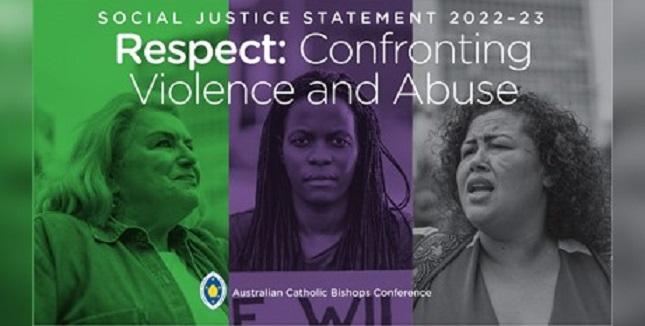
The document draws on data around family and domestic violence, and gathers the insights of people – especially women – on that data. It also reflects on the words and example of Jesus.
“The teaching of Christ urges us to promote relationships marked by respect and freedom rather than coercion and control,” Australian Catholic Bishops Conference president Archbishop Timothy Costelloe SDB writes in the foreword.
“The message of the Gospel is not a message of domination of one person over another but a message of mutual esteem and kindness.”
The statement, citing the Australian Institute of Health and Welfare, explains that family and domestic violence “affects people of all ages and from all backgrounds”, but notes it “predominantly affects women and children”.
Younger women, women with disabilities, people in regional areas, people from culturally and linguistically diverse backgrounds and members of the LGBTQI+ community were highlighted as particularly vulnerable to violence, various studies have found.
The statement also points out that “family and domestic violence is a painful and complex reality for Aboriginal and Torres Strait Islander communities”.
The document’s sections cover the importance of listening to women and children, the drivers and enablers of violence, supporting respectful relationships and the importance of respect, dignity and justice, as well as transformation and hope.

The statement concedes that in some contexts, Scripture has been used to explain or even justify instances of violence against women or children. It rejects such distortions.
Passages used to imply the inferiority of women or children “do not reflect a context in which the equal dignity of every human being created in the image and likeness of God is acknowledged, or in which marriage is based on a relationship of love, mutuality and partnership”.
“The respect due to each member of a family, household or community should reflect the respect and care shown for others by Christ,” the statement says.
The statement promotes programs and agencies that support those who suffer various forms of violence, but also highlights the importance of support for those who perpetrate such violence.

The Catholic Church is a major provider of services for all people affected by domestic and family violence through its dioceses, agencies, religious institutes and other organisations.
Respect: Confronting Violence and Abuse has been published ahead of the Catholic Church’s celebration of Social Justice Sunday on the last Sunday of August – August 28 this year.
The statement and associated resources can be found at: www.socialjustice.catholic.org.au
Chris McPhee visiting Vietnam after two years
Chris McPhee visiting Vietnam after two years
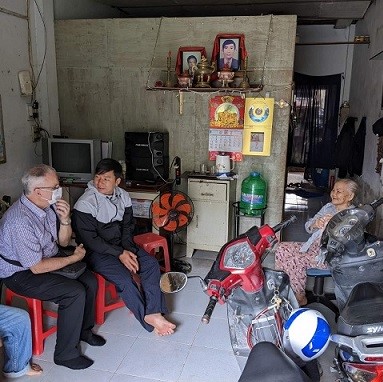
Metting different groups,

celebrating Eucharist,

visiting Hanoi

and looking for pastoral opportunities.

And, now and again, a meal

A Port Moresby story, OLSH
A Port Moresby story, OLSH
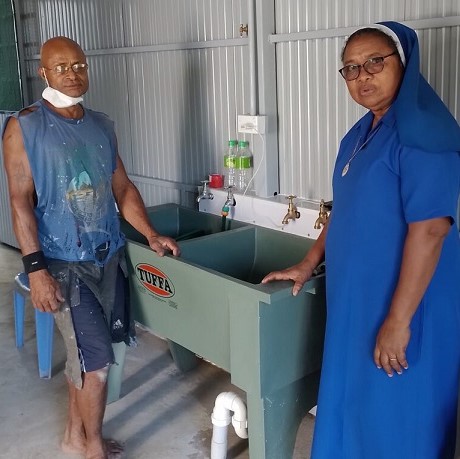
The Hartzer Centre is an aged-care facility attached to the main convent in Port Moresby, the country’s capital, where the Sisters care for elderly OLSH Sisters and MSC missionary priests who have devoted their lives to serving the people of Papua New Guinea.
Eight rooms are dedicated to the care of elderly residents at the centre, and it was an ongoing worry that the facility did not have a dedicated laundry area of its own, with nurses carrying all dirty laundry through the convent dining room to reach the communal washing area.
This has been a pressing hygiene concern, especially in the face of the ongoing coronavirus pandemic.
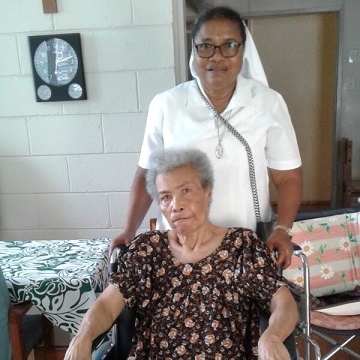
Financial support came from the Irish MSC Province.
Chevalier College, August 21st 2022, the John Fahey Education and Sports Centre
Chevalier College, August 21st 2022, the John Fahey Education and Sports Centre

John Fahey AC won a bursary to attend Chevalier College in the Southern Highlands, enrolling in 1958 and graduating in 1962.
From humble beginnings, John developed his potential and often credited the college with being a critical element in the formation of his character, his moral values and principles.
In his leaving year John was a prefect, a leader in the college's Young Catholic Society, captain of the First XI cricket team and a member of a much-acclaimed First XV rugby team.
The college has already committed to a 6-year scholarship starting in 2022 as a tribute to Mr Fahey and will be undertaking a fundraising campaign to secure an endowment so the award can continue in perpetuity.
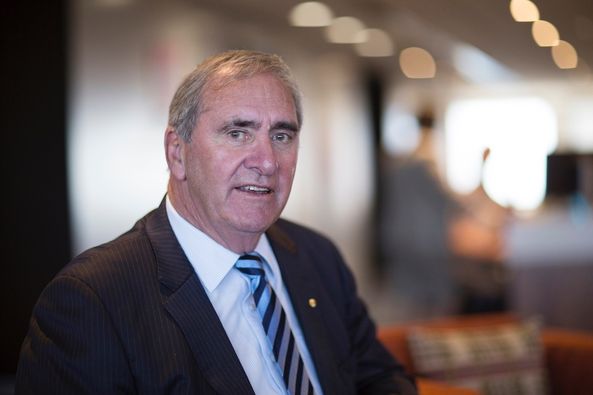
Chevalier College Principal Chris McDermott explained that the approval process for the naming involved extensive discussions and consideration with a number of stakeholder groups, including the college board and the MSC community which owns the college, and had taken some time to complete due to the significance of such an action.
“This is the first time a major building in the college is being named after a past student. Until now the buildings have been named almost exclusively after members of the Missionaries of the Sacred Heart. Our plan represents a new way of thinking about such significant action,” he said.
“This multi-purpose hall is the latest and largest building to be constructed on our campus. It is arranged over two-levels and incorporates a full-size basketball court for a range of indoor sports, changing rooms and break-out areas, as well as adaptable class room spaces that adjoin spectator viewing areas on the mezzanine level.”

“A feature of the building is an automated retractable seating system that when combined with fixed seating gives a capacity of 1300 people, allowing the space to be used for a variety of events, not just sport.”
“Another feature is the marvellous views to the east across the tennis courts and sporting ovals that John Fahey himself played cricket and rugby on, and was also the location for cadet exercises and parades along with the athletic events of that time.”
Congratulations, Newly Professed MSC Vietnam
Congratulations, Newly Professed MSC Vietnam

On the feast of the Assumption of Mary this year, our MSC Australian province celebrated the presence of MSC in Vietnam for 19 years. Starting small in 2003, yet we believe the Spirituality of the Heart draw and will draw more young men to us so that Jesus’ love will be continually made known to all people.

On this day we also celebrated the First Profession of our 4 men Kien, Dat, Khoa and Vu who just arrived back in Vietnam from the Philippines. And joined by the Novice Master from the Philippines and by Bob Irwin.

MSC at Bathurst Island: the Record
MSC at Bathurst Island: the Record
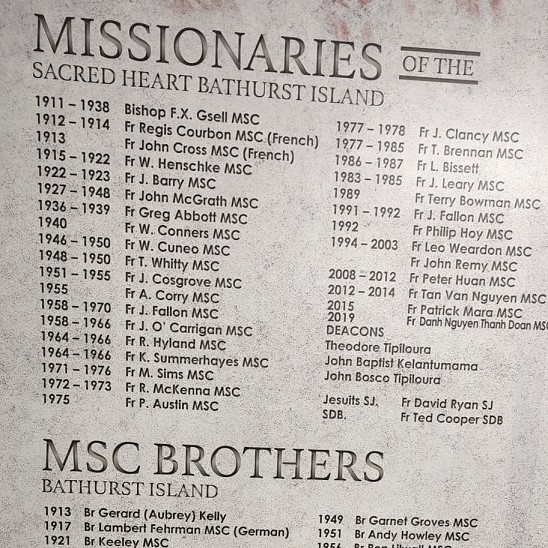
With our leaving Bathusts Island, you may like to see the record of MSC who served there.


